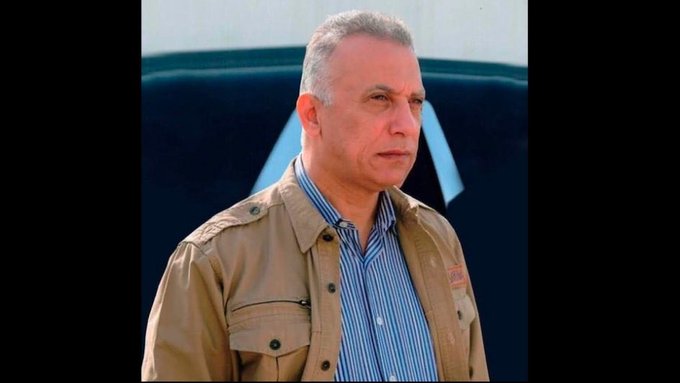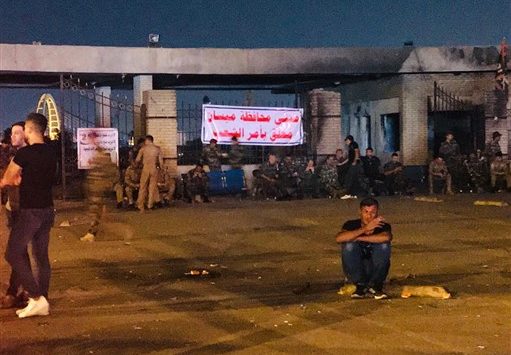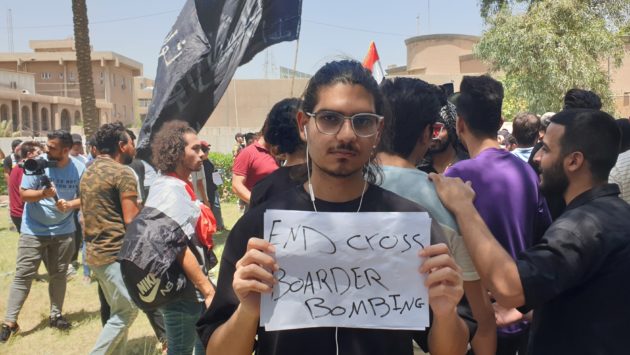Iraqis React to the Possibility of Al-Kazimi as an Alternative to Al-Zarfi as the New Prime Minister
Baghdad – Aktham Saif Alden
6 April 2020
There is a new, yet unstable consensus among a number of leaders of the Iraqi Shiite blocs who refuse to accept Adnan al-Zurfi as the person who should form a new government in Iraq. Due in part to this opposition, the leaders of the opposition parties (including the “AlFatah Alliance” led by Hadi al-Amiri, the “Dolat Alqanon” led by Nuri al-Maliki, the “Alhikmah” led by Ammar al-Hakim, and some leaders of other blocs), proposed the current intelligence chief, Mustafa al-Kazimi, as an alternative to al-Zurfi for the position of the prime minister. His candidacy opens the door to a new political crisis given the continued tensions and alliances between existing parties and the way their dynamics impact the political process. One of the most prominent forces is the “Sairoon Alliance” led by Muqtada al-Sadr.
Mustafa al-Kazimi’s name re-emerged as a substitute for the current Prime Minister-designate, Adnan Al-Zarfi during a meeting that went late into the night of 5 April. His name had come up soon after Mahdi’s resignation, but many expressed reservations about him. Some Shiite blocs rejected him, while militias affiliated with him accused him of being “close to Washington,” and believed him to be involved in the killing of the Iranian Quds Force Commander Qassem Soleimani and the deputy leader of the Popular Mobilization Abu Mahdi Al-Muhandis. Others worried about his plan to limit the use of arms to state run armies and militias. Another meeting was held Monday, 6 April, in which parties and other political forces discussed the crisis and whether al-Kazimi might help the country through.
According to well-informed Iraqi sources, the initiative to re-introduce Mustafa Al-Kazimi as a substitute for Adnan Al-Zurfi, despite backing from several political parties, is still in negotiations: the “Al-Fateh” coalition, the political wing of the “Popular Mobilization” party, supports the nomination as an alternative to Adnan al-Zurfi, while it is strongly opposed by armed factions, most notably the “Kataeb Hezbollah” militia. The “Dolat Alqanon” coalition said it would accept whomever was approved by the other Shiite blocs.
The “Sairoon” coalition led by Muqtada al-Sadr set two conditions for the acceptance of Al Kazemi’s nomination, namely approval of him by all Shiite parties, and “an official announcement that all Shiite parties support him so that he does not face a future similar to the resigned Prime Minister Adel Abdul Mahdi, who failed to secure the continued loyalty of Shiite parties.” He also insists that no political bloc or party may interfere in the formation of the new government nor in its policy decisions. The “Alhikmah” (led by Ammar al-Hakim) supported this option, but the “Alliance of AlNaser” (led by former Prime Minister Haider al-Abadi) is still unclear as they refused to participate in the meetings of 5 April. Sources stress that Al-Kazimi fears that “those who cast his name as an alternative are a merely making a political ploy to overthrow Zurfi. The sources pointed out that “the positions are still not fixed, and there may be changes in the next few hours.”
Fadi al-Shammari, a political office member of the al-Hikma movement, said that “political agreement on Al-Kazimi’s candidacy to head the government, if guaranteed by signatures from the active political forces in Iraq, would end a long polemical debate and prevent political chaos.” In a later tweet, he ndicated further that, “Al-Kazimi has the advantage of being a good manager, with a belief in the logic of Iraq as a single and unified state, the necessity of restricting arms to the hands of the state, and ending external interference in internal affairs.”
Dissent from Kazem Al-Sayyadi, a member of the “Dolat Alqanon,” said that “the Shiite political forces are driven by narrow interests and foreign embassies,” and that “the Shiite leaders do not want to appoint a strong candidate.” In a televised statement, he continued, saying that “Al-Kazimi perpetuates the divisions within the Shiite forces,” and that most who oppose him accuse him of being involved in the killing of the martyrs, Soleimani and Al-Muhandis.
He pointed out that “the major bloc which has won elections has not been respected by anyone since the first session of parliament, and that it is composed of parties that want consensus and quotas rather than firmness and strength.” Observers criticize the contradictory positions inside the camp rejecting Al Zurfi.
Political expert Hisham al-Hashemi summed up the situation by saying that “Every time the Shiite political house succumbs to internal fighting — which has to do more with narrow self-interest surrounding their own wealth and power rather than a care for the common good of the Iraqi people whom they are meant to represent — it becomes intolerable for those individuals and organizations watching from outside. This current conflict may mark the end for many of them!”




